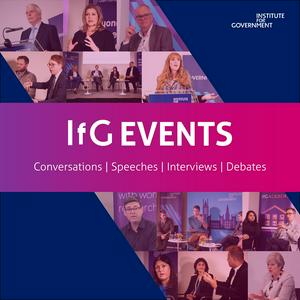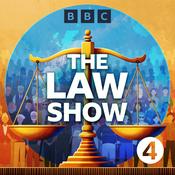379 episodes
- On 13 March 2025, Keir Starmer announced the abolition of NHS England, the arm’s-length body responsible for overseeing, planning, funding and delivering the health service – with its functions to be merged back into the Department of Health and Social Care. Work on the transition is underway but key decisions are still to be made.
What are the risks and opportunities associated with abolishing NHS England? How much progress has been made to date? What can be learnt from previous structural changes to the NHS and other parts of government? How can the government get the reform process right?
To answer these questions and more, this webinar from the IfG and the Nuffield Trust brought together an expert panel featuring:
Mark Dayan, Policy Analyst and Head of Public Affairs at the Nuffield Trust
Stuart Hoddinott, Associate Director at the Institute for Government
Sarah Reed, Senior Fellow at the Nuffield Trust
The webinar was chaired by Nick Davies, Programme Director at the Institute for Government.
This webinar was kindly supported by the Nuffield Trust.
Learn more about your ad choices. Visit podcastchoices.com/adchoices - In 2024, Eluned Morgan MS became the sixth first minister of Wales – and the first woman to hold the role – since the dawn of devolution in 1999. She now leads Welsh Labour into the 2026 Senedd election, which will be held under a new electoral system, and at which Labour faces a double challenge from the rise of Plaid Cymru and Reform.
On 22 January, the Institute for Government was delighted to welcome Eluned Morgan to discuss how devolution to Wales has evolved since 1999, her priorities as First Minister, how the Labour governments in Cardiff and Westminster can cooperate on shared goals, and Welsh Labour’s vision for Wales’s constitutional future.
The first minister was in conversation with Akash Paun, Programme Director of Devolution at the Institute for Government, followed by a Q&A with the live and online audience.
Learn more about your ad choices. Visit podcastchoices.com/adchoices - Following the publication of Whitehall Monitor 2026, the Institute for Government’s annual data-led analysis of the state of the UK civil service, the IfG was delighted to welcome Rt Hon Darren Jones MP, Chief Secretary to the Prime Minister, to set out why he thinks the status quo isn’t working and update on the government’s efforts to renew the state. He announced his plans to shake up Whitehall and hardwire innovation into government so that it can keep pace with a changing world and grasp the opportunities of the future.
The Chief Secretary to the Prime Minister was introduced by Dr Hannah White OBE, Director and CEO of the Institute for Government.
Learn more about your ad choices. Visit podcastchoices.com/adchoices What does Trump mean for relations between the UK and Europe, and the rest of the world?
2026/1/21 | 1h 14 mins.Trump’s second term has been markedly different from his first and has already brought with it the most radical shift in US foreign policy since the Second World War. 2026 has seen Trump ramping up action and rhetoric on multiple fronts with even greater pressure on UK and European leaders to respond.
What do the next three years hold for relations between the UK, US and EU? Are current tactics and strategies working for the UK and Europe or do leaders need to change course? Will the prime minister finally be forced to choose between Washington and Brussels?
On the first anniversary of Trump’s 2025 inauguration, the Institute for Government and UK In a Changing Europe are delighted to invite you to a panel to discuss these and other questions, with:
Sir Simon Fraser, Chair of Flint Global, Chair of Chatham House and former Permanent Under-Secretary, Foreign and Commonwealth Office, 2010-15
Fiona Hill, Chancellor of Durham University, Senior Fellow at Brookings Institution and former Presidential Adviser on Foreign Affairs
Professor Anand Menon, Director of UK in a Changing Europe
This event will be chaired by Dr Hannah White, Director and CEO of the Institute for Government.
We would like to thank UK in a Changing Europe for kindly supporting this event.
Learn more about your ad choices. Visit podcastchoices.com/adchoices- The government is making major changes to the structure of the NHS. NHS England is being abolished, with its functions merged into the Department of Health and Social Care (DHSC). At the same time, the number of Integrated Care Boards (ICBs) is set to be reduced, with many expected to merge. Changes proposed by the 10 Year Health Plan, including contracts for single and multi-neighbourhood providers, will also create changes in local delivery structures.
How can the government ensure that the new national structure works effectively? Should any current NHSE functions remain independent of DHSC? How should the reformed DHSC work regionally, and with ICBs, strategic authorities and trusts? How can the government make a success of the emerging ICB structure? How should local delivery structures be reformed?
To discuss these questions and more, we were joined by an expert panel including:
Dr Penelope Dash, Chair of NHS England
Dame Patricia Hewitt, former Secretary of State for Health and author of the Hewitt Review of ICSs
Samantha Jones, Permanent Secretary at the Department of Health and Social Care
Johan Kahlström, President and Managing Director, UK and Ireland at Novartis Pharmaceuticals UK
This event was chaired by Nick Davies, Programme Director at the Institute for Government.
We would like to thank Novartis Pharmaceuticals UK for kindly supporting this event.
Learn more about your ad choices. Visit podcastchoices.com/adchoices
More Government podcasts
Trending Government podcasts
About IfG Events
The Labour government has a huge majority in parliament – but Keir Starmer’s administration is also facing an incredibly complex set of policy challenges. So how can the prime minister and his team turn around public service performance? What can chancellor Rachel Reeves do to get the economy growing again? What will mission-driven government actually mean in practice? Who should be making the key decisions in Westminster – and beyond? And what will the appointment of a new cabinet secretary mean for the future direction of the civil service?
From reforming how the centre of government works to the battle for the future of the civil service, from making a success of levelling up to achieve net zero goals, IfG EVENTS stimulate fresh thinking and share ideas about how government works – and how it could work better.
Podcast websiteListen to IfG Events, The Gavin Tucker Show and many other podcasts from around the world with the radio.net app

Get the free radio.net app
- Stations and podcasts to bookmark
- Stream via Wi-Fi or Bluetooth
- Supports Carplay & Android Auto
- Many other app features
Get the free radio.net app
- Stations and podcasts to bookmark
- Stream via Wi-Fi or Bluetooth
- Supports Carplay & Android Auto
- Many other app features


IfG Events
Scan code,
download the app,
start listening.
download the app,
start listening.
























